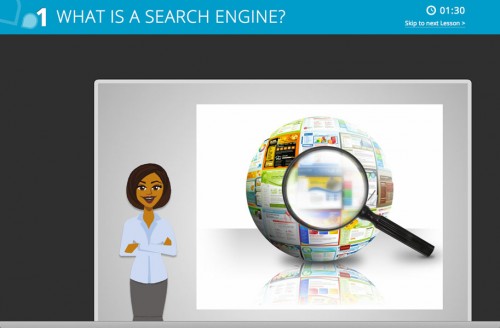The American Library Association (ALA) this week launched a preview version of Digital Learn, a free online resource for librarians working with digital literacy learners. The new hub, which will be fully available June 30, follows recommendations released this month from ALA’s Digital Literacy Task Force.
The recommendations call for more investment in digital literacy, robust collaborations, and more access to digital literacy programming in educational settings. They also encourage school librarians to “identify opportunities to embed digital literacy skills in curricular and research activities.”

Digital Learn’s search engine tutorial.
Says task force member Wendy Stephens, a librarian at Cullman (AL) High School, ALA councilor-at-large, and YALSA’s blog member manager, the task force’s recommendation list “is a tool that people can use in their own local efforts” to gain support from patrons, parents, and community stakeholders. “We wanted to give librarians the weight of ALA behind them.”
Another goal of the guidelines will be in assisting school librarians in understanding issues such as the filtering requirements that impact K–12 learners, which sometimes hinder their access to literacy programs. “Many school districts filter far more content than the law actually requires,” says task force member Frances Jacobson Harris, librarian at University Laboratory High School in Urbana, IL. “This recommendation gives libraries a precise talking point to use when negotiating filter implementation.”
Digital Learn, meanwhile, consists of two main areas: “Teach” and “Learn.” “Teach” is where librarians can virtually gather, forming groups to share best practices and brainstorm. It is “the idea starter” area on the site, Jamie Hollier, the hub’s project manager, tells School Library Journal.
For school librarians especially, Hollier says Digital Learn hopes that they will visit the site and create groups on programs that they’d like to brainstorm about, such as Digital Learning Day or robotics. The goal is for teachers searching for resource—say, on how to create videos—can join a group on Digital Learn that’s geared to that topic. Or, if it doesn’t exist yet, they can start one and seek feedback.
“We’re creating the framework and you provide the content,” says Hollier. “The whole concept is that it will be crowd sourced.” Hollier also notes that entries in the “Teach” area of the site can be rated by others, which adds to the best practices discussion. “When you rate, we ask you to comment at the same time. If something is poorly rated, we want to know why.”
The “Learn” area of the site offers digital literacy tutorials to library patrons and students. Current features include an introduction to email, tips on performing a basic web search, and instructions on using a PC. Many more lessons are expected to be added, and Digital Learn is even discussing the option of partnering with some organizations for K–12 content, Hollier says.
Richard Kong, digital services manager at the Arlington Heights (IL) Memorial Library, sees a lot of potential for Digital Learn’s tutorials. “Our children’s department is definitely interested in offering more classes not only to kids but parents,” says Kong, a panelist in a June 30 ALA session about the hub.
Kong also says he envisions using the site for “partnering and having discussions with our local school district about what parents need to know and what to offer parents to stay up on technology.” And to supplement instruction offered in his library’s digital media lab, Kong would also like to see tutorials in Microsoft Office, Photoshop, Garageband, and iPad use.
What will make people gather at Digital Learn? “PLA is behind it and there are a lot of libraries it can reach,” says Kong. “It has a lot of potential to bring people together in one online forum.”
Stephens agrees. She notes that the new hub has the potential to become a central place for librarians seeking to build digital literacy in their schools and communities. It’s “like a clearing house,” Stephens says, a way to “connect with other librarians and see what they’re doing.” The site also aims to become, she says, “wonderful tool for library patrons and the people we support.”
Digital Learn is a partnership between ALA’s Office of Information Technology (OIT) and Chief Officers of State Library Agencies, and is instituted by the Public Library Association (PLA) with a grant from the Institute of Museum and Library Services (IMLA).


